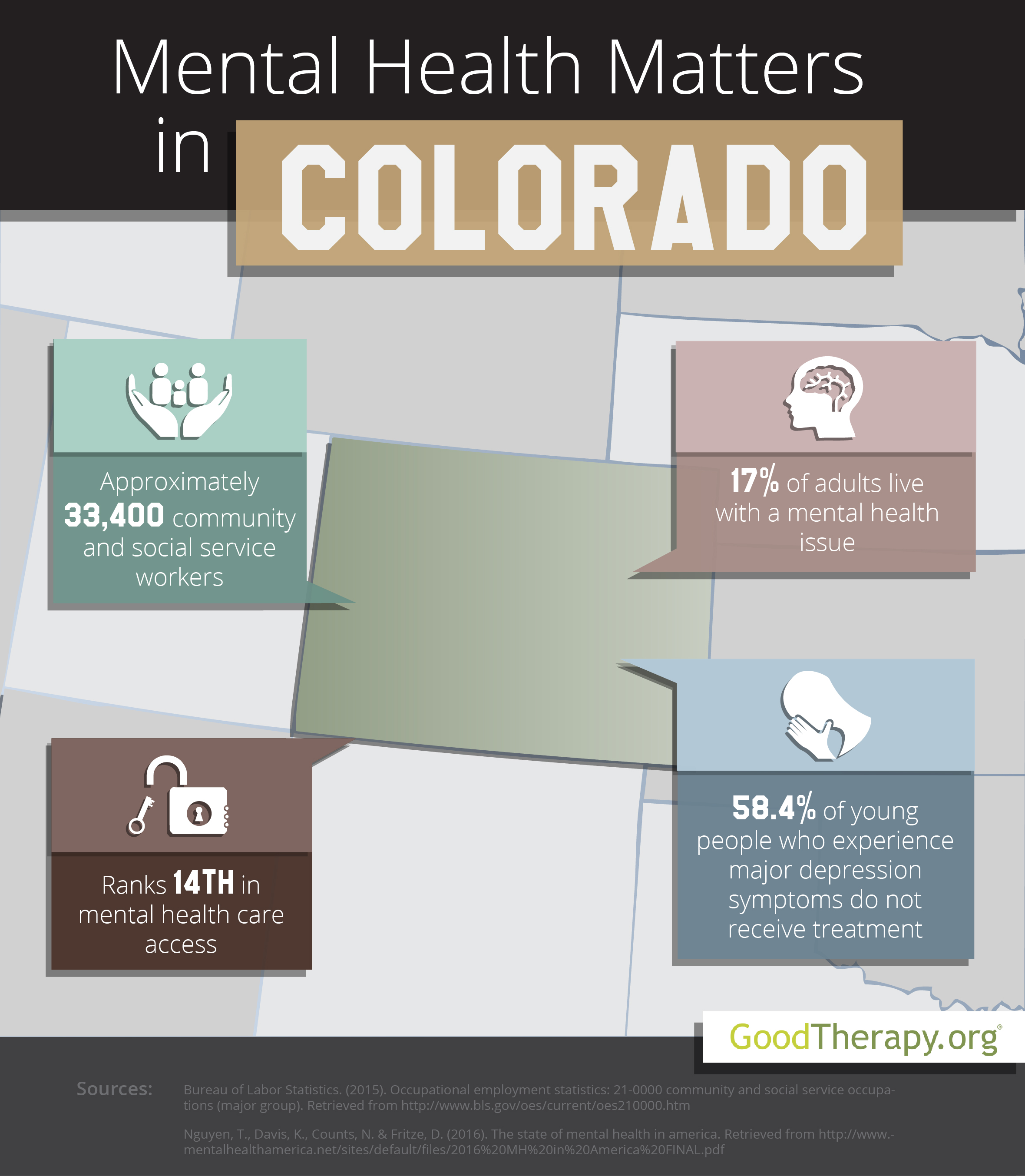Find a Therapist in Colorado
Welcome to the Colorado therapist directory at GoodTherapy.org. Our directory is the fastest and safest way to find a good counselor or therapist in Colorado cities. We only include professional therapists, counselors, and psychologists whose work accords, in attitude and orientation, to the elements of good therapy. Find a therapist or counselor in your Colorado zip code, or click on the links below to see the counselors in your city. If you are looking for telehealth therapy you can click here to see all Colorado telehealth therapists.
Adams County
Arapahoe County
Boulder County
Broomfield County
Denver County
Douglas County
Eagle County
El Paso County
Elbert County
Gunnison County
Jefferson County
Larimer County
Mesa County
Montrose County
Ouray County
Pueblo County
Weld County
Mental Health Matters in Colorado
In 2015, the state of Colorado had a population of approximately 5.5 million people, according to estimates from the United States Census Bureau. The Bureau of Labor Statistics claims, of that total, roughly 33,410 residents worked in occupations involving community and social service. Typical jobs within this field included working as a guidance counselor, clinical social worker, therapist at a depression treatment center, child psychologist, religious worker, parole officer, or as a marriage therapist. In Colorado, residents working within these occupational fields earned an annual average salary of $47,590.
 Mental Health in Colorado
Mental Health in Colorado
The state of Colorado obtained an overall rank of 19th from the State of Mental Health in America survey conducted by Mental Health America (MHA) in 2016. This overall rank illustrates how mental health conditions, resources, and practices in Colorado compare with those in the remaining 49 states and the District of Columbia.
Data from the 2016 MHA survey suggests a relatively small percentage of adults in Arizona are affected by adverse mental health conditions. The state ranked 7th in this category, with only about 17% of adult residents reporting emotional, behavioral, or psychological issues. According to health care analysts, mental health professionals, and therapists in Colorado, one major factor that correlates with this ranking is the relatively low rate of obesity among men and women in the state.
Despite these findings, there are other areas of concern that have been identified by mental health professionals in the state. Perhaps chief among them is the abuse of illicit drugs and alcohol, which is prevalent in both adult and adolescent residents. The 2016 MHA study states that 10% of adults, and approximately 7% of young people display substance dependence. This state is ranked 47th and 46th respectively, for these two mental health measures, indicating a high percentage of residents affected.
The Substance Abuse and Mental Health Services Administration (SAMHSA) reports from 2012-2013, 64.4% of teenagers in Colorado perceived no great health risk from drinking five or more alcoholic beverages once or twice per week; additionally, 80% of teenagers saw no significant risk in smoking marijuana once per month. Both of these percentages are higher than the national average.
Residents experiencing addiction to illicit drugs or alcohol are encouraged to find a therapist or take advantage of local mental health resources such as drug rehab facilities, detox centers, or residential treatment centers in Colorado. While there are no guarantees that treatment will resolve these issues, many are able to learn effective coping strategies that may help improve their lives.
References:
-
Bureau of Labor Statistics. (2015). Occupational employment statistics: 21-0000 community and social service occupations (major group). Retrieved from http://www.bls.gov/oes/current/oes210000.htm
-
Nguyen, T., Davis, K., Counts, N. & Fritze, D. (2016). The state of mental health in America. Retrieved from http://www.mentalhealthamerica.net/sites/default/files/2016%20MH%20in%20America%20FINAL.pdf
-
Substance Abuse and Mental Health Services Administration. (2014). Behavioral health barometer: Colorado, 2014. Retrieved from http://www.samhsa.gov/data/sites/default/files/State_BHBarometers_2014_1/BHBarometer-CO.pdf
-
United States Census Bureau. (2015). Quick facts: Colorado. Retrieved from http://www.census.gov/quickfacts/table/PST045214/08
Advanced Search | Browse Locations | International Search